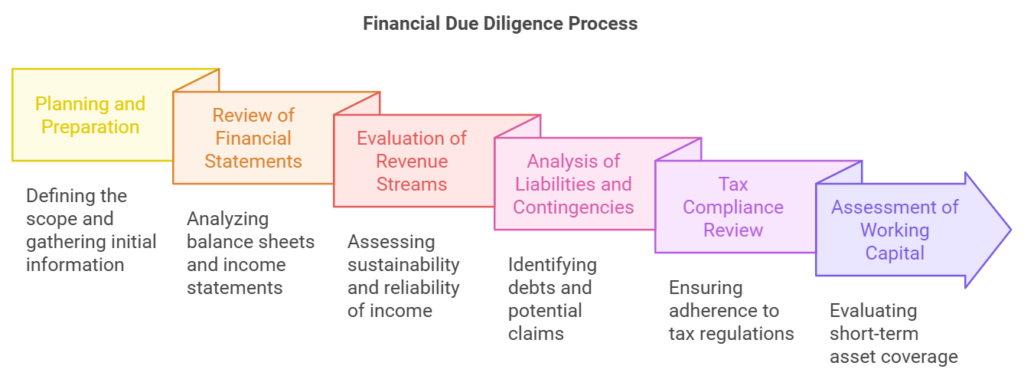Introduction
Financial Due Diligence (FDD) is a critical process that provides insights into the financial health of a business. Whether you are looking to acquire a company, invest in a new venture, or enter into a partnership, conducting thorough financial due diligence is essential to understand the risks, liabilities, and opportunities associated with the entity in question. In the United Arab Emirates (UAE), where the business environment is dynamic and highly regulated, FDD helps businesses make informed decisions and maintain compliance with local regulations.
This blog will explore the importance of financial due diligence in the UAE, the steps involved in the process, and best practices to ensure a comprehensive evaluation.
What is Financial Due Diligence?
Financial Due Diligence is the process of thoroughly assessing a company’s financial records, assets, liabilities, operations, and overall financial position. It provides potential investors or buyers with an in-depth understanding of the financial risks and benefits of acquiring or investing in a business. FDD aims to validate the accuracy of financial information, identify any hidden risks, and ensure that the target company is compliant with applicable laws and regulations.
In the UAE, financial due diligence is particularly important due to the country’s complex regulatory environment and its position as a major business hub. Investors and stakeholders need to understand the nuances of local laws, such as AML regulations, tax compliance, and industry-specific requirements.
Importance of Financial Due Diligence in UAE

1. Identifying Financial Risks
The primary objective of financial due diligence is to identify potential risks that may affect the profitability or sustainability of a business. Risks such as hidden liabilities, unrecorded debts, pending legal cases, or irregular financial transactions can significantly impact the value of an investment.
In the UAE, businesses must also comply with strict AML (Anti-Money Laundering) regulations, and any violation can lead to severe financial penalties. Through financial due diligence, investors can identify AML compliance gaps and ensure the target business adheres to all regulatory standards.
2. Verifying Financial Statements
FDD involves a detailed examination of the company’s financial statements, including balance sheets, income statements, and cash flow statements. This verification process helps ensure that the financial information presented by the company is accurate and reliable. Any discrepancies in financial data can raise red flags and indicate potential issues that require further investigation.
Learn more about the importance of accurate financial reporting by exploring our AML Audit Services.
3. Ensuring Regulatory Compliance
The UAE has stringent regulatory requirements for businesses, including compliance with tax laws, employment laws, and anti-corruption measures. Financial due diligence helps investors verify that the target company complies with all relevant regulations and has no outstanding legal issues that could pose a risk to future operations.
4. Assessing Profitability and Growth Potential
One of the key aspects of FDD is to assess the profitability and growth potential of the target business. This involves analyzing revenue streams, profit margins, cost structures, and market opportunities. In the UAE, where sectors like real estate, tourism, and finance are experiencing rapid growth, understanding the company’s potential for expansion is crucial for making informed investment decisions.
5. Informed Decision-Making
Conducting financial due diligence ensures that investors have access to all the necessary information to make informed decisions. It allows buyers to negotiate better terms, set appropriate purchase prices, and develop strategies to mitigate identified risks.
Key Steps in the Financial Due Diligence Process

1. Planning and Preparation
The first step in the FDD process is planning and preparation. This involves defining the scope of the due diligence, identifying key areas of focus, and gathering initial information about the target company. The scope of due diligence may vary depending on the nature of the transaction, the industry, and the specific risks involved.
2. Review of Financial Statements
A detailed review of the financial statements is a critical part of the due diligence process. This includes analyzing the balance sheet, income statement, cash flow statement, and notes to the financial statements. The goal is to verify the accuracy of the reported financial position and performance of the company.
3. Evaluation of Revenue Streams
The next step involves evaluating the company’s revenue streams to understand the sustainability and reliability of its income. This includes analyzing customer contracts, sales trends, and any concentration of revenue from a small number of customers. Identifying any irregularities or risks associated with revenue is crucial for determining the long-term financial health of the business.
4. Analysis of Liabilities and Contingencies
Financial due diligence also involves a thorough analysis of the company’s liabilities and potential contingencies. This includes identifying any outstanding debts, legal liabilities, or potential claims against the company. It is important to understand the nature of these liabilities and how they may affect the company’s financial stability.
5. Tax Compliance Review
Tax compliance is a significant component of financial due diligence in the UAE. Businesses are required to comply with VAT and other tax obligations as per UAE regulations. The due diligence process involves reviewing the company’s tax filings, assessing any potential tax liabilities, and ensuring that the company is in compliance with tax regulations.
For more information on tax compliance in the UAE, visit our Regulatory Reporting Services.
6. Assessment of Working Capital
Assessing working capital is essential to determine whether the company has enough short-term assets to cover its short-term liabilities. A company with insufficient working capital may face liquidity issues, which could impact its ability to sustain operations. Understanding the company’s working capital requirements helps investors plan for future financing needs.
7. Review of Internal Controls
The FDD process also includes a review of the company’s internal controls to ensure that effective mechanisms are in place to manage financial transactions, prevent fraud, and maintain compliance with regulations. A lack of adequate internal controls can expose the business to financial and operational risks.
Explore our Compliance Department Setup Services to learn how to establish effective internal controls.
8. Analyzing Cash Flow
Analyzing the company’s cash flow is crucial for understanding its ability to generate cash and sustain its operations. Cash flow analysis involves evaluating cash inflows and outflows from operating, investing, and financing activities. Positive cash flow is an indicator of the company’s financial health, while negative cash flow may indicate potential issues.
Challenges in Conducting Financial Due Diligence in the UAE
1. Limited Access to Information
One of the challenges in conducting financial due diligence is limited access to information, especially in cases where the target company is not transparent. In the UAE, businesses must adhere to strict disclosure requirements, but some companies may still provide incomplete or inaccurate information.
2. Complexity of Regulatory Environment
The UAE has a complex regulatory environment, and businesses must comply with various regulations related to AML, taxation, and corporate governance. Navigating these regulations during the due diligence process can be challenging, especially for foreign investors who may not be familiar with local laws.
3. Identifying Hidden Liabilities
Hidden liabilities, such as pending lawsuits or unrecorded debts, can significantly impact the valuation of a business. Identifying these liabilities during the due diligence process requires a thorough review of legal documents, contracts, and other financial records.

Best Practices for Effective Financial Due Diligence
1. Engage Experienced Professionals
Financial due diligence is a complex process that requires expertise in accounting, taxation, and regulatory compliance. Engaging experienced professionals, such as financial analysts, auditors, and legal advisors, can help ensure that the due diligence process is thorough and effective.
2. Develop a Comprehensive Checklist
Developing a comprehensive due diligence checklist is essential to ensure that all key areas are covered during the evaluation. The checklist should include items such as financial statements, tax compliance, legal liabilities, customer contracts, and internal controls.
3. Conduct Site Visits
Conducting site visits can provide valuable insights into the company’s operations, assets, and management practices. Site visits allow investors to verify the existence and condition of assets, assess the efficiency of operations, and interact with key management personnel.
4. Verify Information with Third Parties
To ensure the accuracy of the information provided by the target company, it is important to verify key data with third parties. This may involve contacting suppliers, customers, banks, and regulatory authorities to confirm financial transactions and assess the company’s reputation.
5. Utilize Technology for Data Analysis
Leveraging technology for data analysis can enhance the efficiency and accuracy of the due diligence process. Automated tools can help analyze financial statements, identify trends, and detect anomalies that may indicate potential risks.
How CAMC Can Assist with Financial Due Diligence

Chartered AML Consultants (CAMC) offers comprehensive financial due diligence services to help investors make informed decisions. Our services include:
1. In-Depth Financial Analysis
Our team conducts an in-depth analysis of the target company’s financial statements, cash flow, and revenue streams to provide a clear picture of its financial health.
2. Regulatory Compliance Assessment
We assess the target company’s compliance with UAE regulations, including AML, taxation, and corporate governance requirements. Our goal is to identify any compliance gaps and provide recommendations to address them.
3. Identification of Risks and Liabilities
We help investors identify potential risks and liabilities, including hidden debts, legal claims, and regulatory issues. Our comprehensive approach ensures that no aspect of the target company’s financial health is overlooked.
4. Ongoing Support
Our ongoing support services include assistance with post-acquisition integration, compliance monitoring, and implementation of best practices to enhance the financial performance of the acquired business.
Conclusion
Financial due diligence is a crucial process for businesses and investors looking to enter the UAE market or acquire a local company. It provides valuable insights into the financial health of the target business, identifies potential risks, and ensures compliance with regulatory requirements. By conducting thorough due diligence, investors can make informed decisions, negotiate better terms, and mitigate financial and operational risks.
Partnering with experienced professionals like CAMC can make the due diligence process more efficient and effective. Our team of experts provides tailored financial due diligence services to help investors navigate the complexities of the UAE business environment and achieve their investment goals.
For more information on how CAMC can assist with financial due diligence, contact us today.
References
Financial Conduct Authority (FCA) – AML Guidance
https://www.fca.org.uk/firms/financial-crime/aml
United Nations Office on Drugs and Crime – Anti-Money Laundering
https://www.unodc.org/unodc/en/money-laundering/index.html
OECD – Politically Exposed Persons (PEPs) in AML
https://www.oecd.org/corruption/anti-bribery/PEPs-in-AML




